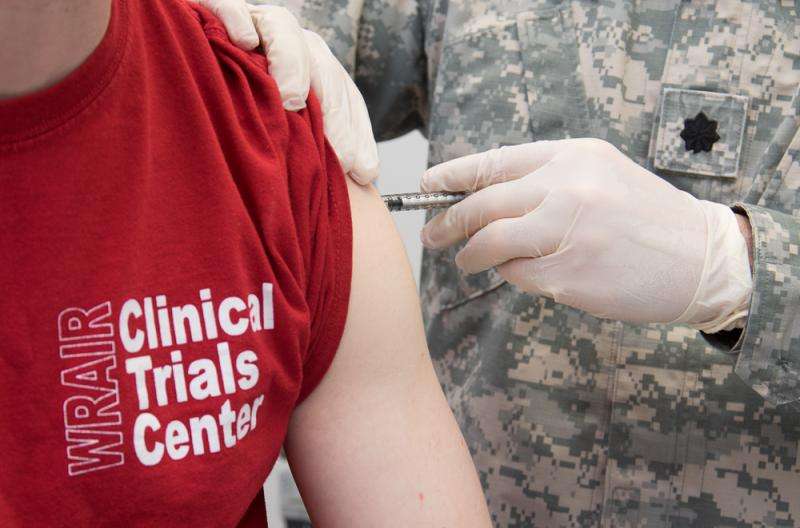Walter Reed Army Institute of Research begins phase 2 clinical trial of Ebola vaccine

The Walter Reed Army Institute of Research (WRAIR) today announced the initiation of a Phase 2 clinical trial to evaluate the safety and immunogenicity of a prime-boost Ebola vaccine regimen in both healthy and HIV-infected study volunteers.
This study includes two vaccine candidates, Ad26.ZEBOV from Crucell Holland B.V., one of the Janssen Pharmaceutical Companies of Johnson & Johnson, and MVA-BN-Filo from Bavarian Nordic, which will be given sequentially as a "prime boost" regimen. Seventy-five volunteers will receive a prime dose with MVA-BN-Filo followed by a boost with Ad26.ZEBOV at the WRAIR Clinical Trials Center in Silver Spring, Md. Early next year, WRAIR-affiliated sites in Africa will also begin evaluating this regimen, as well as a vaccination schedule beginning with Ad26.ZEBOV and then boosted with MVA-BN-Filo.
Researchers will assess the safety and tolerability of the vaccine schedules and characterize the immune response, which should help them better understand these different regimens. Janssen and other development partners have generated preliminary data from a small group of healthy subjects demonstrating that both regimens were safe and immunogenic.
The study will strengthen safety and immunogenicity evidence of the regimens in healthy subjects and extend the population studied in Phase 1 to include volunteers up to and including 70 years of age and volunteers with stably suppressed HIV-infection.
"It is critical that we know these vaccines are safe and immunogenic in the communities where they will be used in Africa," said Lt. Col. Julie Ake, an infectious disease physician, U.S. Military HIV Research Program (MHRP) Principal Deputy and protocol chair for the international study.
The study includes HIV-infected volunteers because they represent some of those who might benefit from a preventive Ebola vaccine in Africa. "It's an important consideration given that both of these viruses can be present in the same communities," said Col. Nelson Michael, MHRP Director.
This clinical trial is a collaboration between WRAIR and Crucell Holland B.V., one of the Janssen Pharmaceutical Companies, with funding from the Joint Vaccines Acquisition Program at the Department of Defense's Joint Program Executive Office for Chemical and Biological Defense.
Initially conducted at WRAIR in Silver Spring, Md., the study will expand to six sites in Africa in early 2016. Approximately 575 volunteers will participate in total. It will be conducted at clinical research sites affiliated with WRAIR's Military HIV Research Program in Nigeria, Uganda, Kenya, Tanzania and Mozambique.
This is the second Ebola vaccine clinical trial conducted at WRAIR, and will be the fourth Ebola vaccine study conducted in Africa by the Institute and MHRP.
"Infectious diseases such as Ebola pose a significant threat to the U.S. Military and the global community," said Col. Stephen Thomas, WRAIR's Deputy Commander of Operations. "WRAIR has extensive expertise in infectious diseases and an international research network in countries where diseases are endemic, giving us an ideal platform to conduct these types of studies."


















